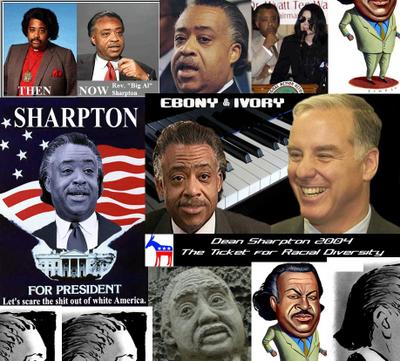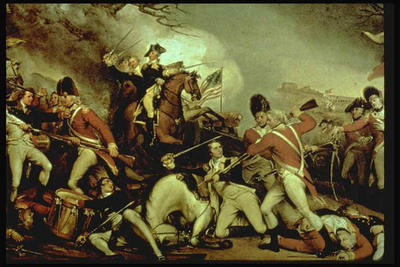
There was supposed to be some kind of a DFNYC event where you get together and call a bunch of people, but instead I got an email saying the Ferrer campaign would rather DFNYC people showed up at the campaign headquarters to help any way they can.
So I showed up a little after noon. Not far from Times Square. That must be the campaign headquarters district in town, because I think Siegel had his headquarters somewhere around there as well. I was just going to soak the atmosphere, and try and throw in a few ideas.
I got to meet last name Castro. "Where I come from, people talk of Castro like he were Bob Marley. Any relation?"
Jesse Jackson was in town, and Castro was on her way to attend an event with him. How lucky of me! Too bad I did not have my camera with me. But, oh well.
Every town worth its salt in the South has some street named after Martin Luther King. They despise you while you are around, and they worship you after you are gone. And there was this street in Harlem. Only later in the day I learned Bill Clinton's office was on the same street.
If he were not black, or if this country were not racist, Jesse Jackson would have been president somewhere along the way. That man understands the contours of race relations like a physicist and quantum physics. He has the instinct for the political process, for power. He has fought so many battles by now, on his face rests the cool of a statesman.
Sharpton has unique hair. I mean, I have seen it on TV and in pictures and stuff, but when you walk right behind him for a little while, you really notice it.
The first meetup for Howard Dean I attended was in Bloomington, Indiana, in October 2003. It was a home setting, over a dozen Deaniacs in attendance. Bloomington is a progressive town, but it is the Midwest. Everyone was white. We were there to watch a Democratic presidential debate. I got this clear impression people were laughing harder to Al Sharpton's jokes because I was in the room. So I guess Al Sharpton and I are not that unrelated after all.
For much of the walk, march, rally, whatever you will call it, I was distributing Ferrer campaign literature. Towards the end I got to shake the Sharpton hand, and the Jackson hand. Jackson looks you in the eyes, and then he locks you. Suddenly the rest of the world goes away for a small frame of time. Suddenly all the background noise is gone, he is so looking at you. I was not nervous. But I was too happy, this was too big a moment. This was my moment to say a significant one liner. I said hello. All I could say.
You should see the crowd react to Jesse. In Harlem. I saw women who were literally delirious and shaking. Jumping up and down on their feet. These people were not going for handshakes. Nah. Not their style. They wanted full-blown hugs, hugs that last a while. Young men, old men, schoolchildren. This is not your run of the mill politician. This man is in a league of his own, a Senior Statesman of the Democratic Party for life. This man has a gift.
Whoever is the first black to make it to the White House, perhaps Obama, he or she will be standing on the shoulder of this particular giant.
The black woman president of Manhattan was also there. I got to shake her hand as well. Virginia.
I hope this really boosts Ferrer among the blacks. It is the strange psychology of the powerless that a lot of blacks in Harlem seem to be behind Bloomberg.
Jackson and Sharpton spoke. Jackson mentioned Ferrer had helped in his 1984 and 1988 bids for the White House. And Sharpton said Bloomberg was "Guliani with good manners." That is not a compliment. These black leaders, they speak poetry. They have a slightly different grip on the English language. There is this rhythm. This sway. Sometimes words rhyme, if not the metaphors do. They speak different. Maybe it is the cocktail of the undercurrent of black culture and an European language. Something is going on.
Sharpton mentioned some figures. 50% of blacks unemployed, 40% of Hispanics. That was heartbreaking to hear. They should be calling the National Guard on this one, maybe the Fire Department. That is not a campaign detail, that is a crisis. Really made me think. What's going on? Either democracy and the market are not working, or they have not been introduced. I would like to believe it is the latter. The chronic unemployment is a tragedy. But it is also policy level fascination. Unemployment should be more in the 10% or a 5% range. And I do believe it can be done. You introduce democracy and the market, that is what. A functioning democracy would be where each voter feels direct ownership of the top office and the city budget. Currently there is a disconnect. Market would be about micro credit. Credit without collateral, credit at lower rates than usual.
Black America continues to be so very neglected. Martin Luther King started the work. He sure did not come anywhere close to finishing it. I mean, one should be able to imagine a high tech boom in Harlem.
"Keep hope alive."
After the event I dropped by again at the Ferrer headquarters. I was there for a few hours. Got to stuff quite a few envelopes.
But I was trying to suggest an idea: I did talk to quite a few people.
Bloomberg has blanketed the airwaves with his ads because he has tons of money. He is the one sitting at home, Ferrer has been out doing a ton of events. But the image out there is the opposite. Use a few camcorders, record all the events, and put them up at your website.
The idea did not make much headway in the maze of bureaucracy.
"We do take pictures and post them."
"All our five or six TV ads are at the site."
"I have been here only a week."
"All our events are listed at the site."
Political consultants with years of experience are very good at the details they have mastered. But a paradigm shift is something else. Experience and expertise are great stuff, but new, good ideas stand in a class of their own. Ferrer is not as behind as the polls would have you believe, but he is behind, and that asks for something inexpensive and drastic. Or at least that is where I stand.
Towards the end of the Jesse Jackson event, one elderly volunteer kept emphasizing upon me the point that it was okay to take Bloomberg's money if he gives it to you to work on his campaign, just take the money and don't do the work. And he did that in a polite way. Granted it was a largely black and Hispanic crowd, but did I look that out of place? Are a lot of Indians Republicans? I know the most famous one is: Congressman Bobby from Louisiana.
First he started talking to Castro in Spanish. He did not want me to understand. Then Castro eased him into English. And that is when he gave me his advice.
Before I left he pulled out a letter of endorsement he had composed, in English and Spanish.
"I wrote it myself," he said with pride glistening in his eyes.
"Where did Bloomberg make his money? It must be drug money." He was not trying to sound clever. He totally meant it.
Pass me some loyalty stripes I can spray on myself.
Bobby, you are giving an entire subcontinent a bad name, man. Switch, please.
